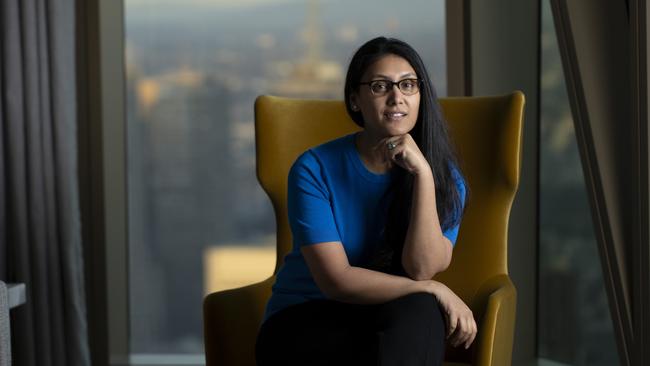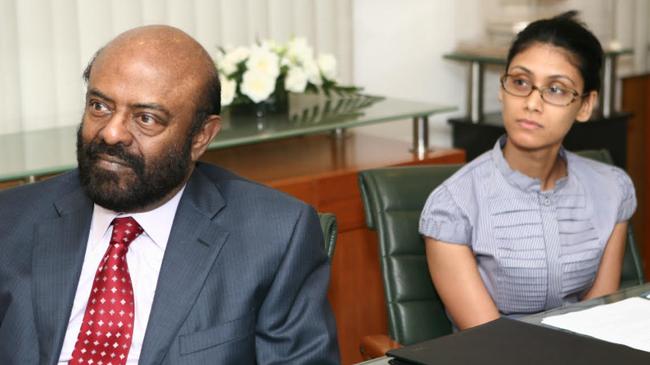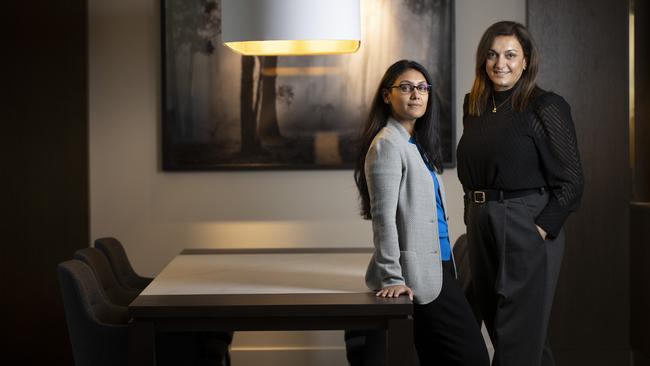Inside the private world of India’s richest woman, tech leader Roshni Nadar Malhotra
She’s been called one of the most powerful women in the world and is the heiress to a $US36.5bn tech empire fortune, but Roshni Nadar Malhotra is more than an entitled, flashy billionaire.

She has held the title of the richest woman in India and the 60th most powerful woman in the world.
Roshni Nadar Malhotra is heir to the $US36.5bn fortune of Indian technology doyen Shiv Nadar, who founded HCL Technologies in 1976 and built that country’s first personal computer.
She lives in a mansion in Delhi’s Friends Colony East area, home to India’s highest profile politicians and top businessmen, a $US15m gift from her father a decade ago.
In 2009 she and husband Shikhar Malhotra were married in a lavish ceremony at the then Indian minister of road transport’s opulent bungalow.
In July this year Nadar Malhotra was conferred the Chevalier de la Légion d’Honneur, the highest civilian award of France, for her work in business promoting economic ties between France and India and her commitment to social and environmental causes.
Yet the now 42-year-old chairwoman of HCLTech, India’s third-largest IT services company and the only woman leading an Indian IT major, looks, sounds and acts nothing like an entitled, flashy billionaire heiress.
During a two-day visit to Australia and New Zealand – her first since taking the chair four years ago – and in a wide-ranging interview, she acknowledges her good fortune to be the only child of billionaire parents.

“I’m a first generation inheritor. I am proud and proud to say it. I’m not a politician so must not be apologetic about it,” she declares with a wide smile while dressed in a casual shirt and trousers, as we chat watching the sun set over the western suburbs of Melbourne from the 80th floor of the city’s suave Ritz-Carlton hotel.
She’s never dreamt of having siblings: “If you don’t know, then you don’t know what you’re missing,” she muses.
But she quickly adds that her now 79-year-old father has always demanded accountability from his staff, whether they be family or not.
“I think that I have to give it to Shiv and I’m not saying it because he’s my father. But I think his style of working for all of us has been so accountability driven,” she says.
“He was never a controlling founder. He was a founder that delegated and expected you to show up. He was also a very tough taskmaster.
“So many people have stayed at HCL for so long, and now they are in the leadership positions they are because they were empowered at every step and given huge responsibility.”
Nadar Malhotra’s story is an unusual one, given her heritage.
While she grew up surrounded by business and technology, she was initially not fond of it.
She did her schooling at the Vasant Valley School in New Delhi suburbia before earning an undergraduate degree in radio, television and film from Northwestern University outside Chicago in 2003.
She was then an intern at media giants CNBC and CNN before working as a TV news producer with Sky News in London.
“I was living by myself in London. All my school friends from India who did engineering and economics were all working at investment banks and consulting firms. Then there was me working at Sky News. So it was quite funny,” she says.
“I was in the newsroom most of the time. I was not on the road. But there was no Instagram and social media wasn’t what it is today. So I also used to find it absolutely amazing that so much of what the world consumed was decided by five or six people in a newsroom.
“If you look today at what is happening in technology, it is a technology avatar coming at you. Now when you search something, algorithms decide what you get and what you miss …
“Today, in the world that we live in, misinformation is absolutely the biggest issue. But is it misinformation or is it just selective information? It’s fascinating. That period of my life has certainly made me reflect.”
Nadar Malhotra has long been fond of content creation. A classically trained musician, she has produced a TV series for the Animal Planet/Discovery channels about the most endangered wildlife species in India and once even made a children’s film.

She is also a thrillseeker, having climbed the Sydney Harbour Bridge and skydived in the North Island of New Zealand. Each year her family goes on safari holidays in Africa, satisfying her love of nature.
“My father and mother are very dynamic individuals. I think that it was probably part of their process to let me find myself and they encouraged that. They said, ‘Just go do whatever you want’,” she says of her early media career.
“Then when the time came to be good Indian parents, they told me ‘Please go to business school’.”
So after three years in London, she returned to the US to complete an MBA in social enterprise at her alma university from the Kellogg School of Management. At Kellogg, she was awarded the Dean’s Distinguished Service Award.
“I have to give my parents full credit because they didn’t ask me to do engineering. My father is an engineer. They didn’t ask me to go into tech. They only said ‘Just whatever you do, be good at it. Keep the grades up’,” she says.
But the allure of working for her father eventually drew her to HCL.
A year into her initiation she rose to the rank of executive director. In 2009 she became CEO of HCL’s holding company, just over a decade before she took over from her father as chairman of HCL Technologies.
Asked how wealth has changed her, she replies: “I think what HCL has truly given me is opportunity and access. That’s what I truly do value. To be able to be at that seat, you get access to a lot of opportunities to learn and meet with a lot of people who have tremendous stories. I think that’s really the true wealth.”
Importantly she has never been conscious of carrying the famed Nadar name. Nor has she perceived it as a burden.
“I’m so proud. It is a privilege. I’m not conscious of that at all,” she declares.
“You can’t be, otherwise you’ll never get anything done by filling your brain with stuff which is what other people perceive.”
Learning from the best
Nadar Malhotra’s childhood was spent staying close to her parents and her father even used to take her into his office regularly.
She describes her most important lesson from him in a single word: resilience.
Shiv Nadar, who hails from a rural region outside Chennai – formerly known as Madras and capital of the southernmost state of India – has eight siblings and lost his father when he was 12 years old.
He went to work in Delhi at the age of 23 and fell in love with his now wife, Kiran, who is Punjabi and has a different language and ethnic background.
Which is why HCL was the only big Indian tech company to be born in North India.
Kiran Nadar, an art lover and philanthropist, was a gold medallist and captain of her team in the card game of Bridge at the Commonwealth Nations championships held in conjunction with the Commonwealth Games on the Gold Coast in 2018.
“I’m still learning from her. Because even at 73, she’s just absolutely dynamic. She is a go-getter,” her daughter says.
Roshni Nadar Malhotra notes that her parents sent her to an Indian school, even though they could easily afford to put her in the British or American schools in Delhi which most of her friends and her husband went to.
They now send their sons, who are 10 and 7, to a Shiv Nadar school in Delhi run by the Shiv Nadar philanthropic Foundation, which is focused on education.
In a rare public comment in 2018, Shiv Nadar said he didn’t want to be remembered only as the architect of HCL, but also for the transformational work of the Foundation.
“It is very interesting to see our sons navigate and be in a school whose name is actually their grandfather. Yet their surname is Malhotra. So no one really knows. But I think that is the best way to keep them in check,” their mother says proudly.
Despite being the founder’s daughter, Nadar Malhotra quickly returned to work after giving birth to both her sons. She doesn’t apologise for it.
“A lot of people are like, ‘Oh, you don’t spend that much time with your kids because you are out so much and all that stuff’,” she says.
“I think kids who see their parents work really hard turn out really well. Now I just hope that premise holds with ours.”
She has previously said: “I am not one of those guilty mums because my parents weren’t guilty parents.”
In addition to her role as chairwoman at HCLTech, she is a dedicated philanthropist as a trustee of the Shiv Nadar Foundation.
The foundation runs a group of senior secondary schools under the VidyaGyan banner – an academy for economically underprivileged, meritorious students from Uttar Pradesh state in northern India.
She is also a passionate conservationist, working towards conserving ecosystems through strategic collaborations as the founder and trustee of The Habitats Trust.
“I think we’ve got an amazing foundation. We are the largest now in India, from a family perspective. To date, we’ve committed and spent $US1.5bn in India just building institutions, universities, schools and we are just building the museum,” she says.
“It is a lot of fun because we are quite involved. Taking time out and being involved keeps your head to the ground and you are accountable. You are responsible for providing a quality product.”
Putting gender on the agenda
By 2030, HCLTech aims to improve gender diversity in its workforce to 40 per cent and increase gender representation in senior leadership levels to 30 per cent.
Currently more than 30 per cent of its directors are women.
“Just having diversity right at the top always helps because it means diversity of thought, diversity of opinion, diversity of conversation. If that reflects in good decisions, I think that HCL is a better company for it,” Nadar Malhotra says.
In November last year HCLTech broke new ground with the appointment of Sonia Eland as the company’s first female country manager for Australia and New Zealand.
Eland, previously the technology strategy and transformation partner at Deloitte, brought more than 30 years of technology and consulting experience to her new role.
Eland says: “(Being female) you carry a weight, you carry expectations that you must be successful and that you will pave the way for others.
“That is above and on top of the normal things you expect a leader to be doing. So there is this additional kind of element to it.”
Australia is one of HCLTech’s fastest growing regions globally and, with Singapore and New Zealand, now its third pillar of international growth – behind America and Europe.
The firm has over 2000 employees in Australia and New Zealand, and Nadar Malhotra’s visit to the country followed on from HCLTech’s chief executive, C. Vijayakumar’s visit in May.
“Yes a lot of Indian tech companies are servicing them, but a lot of Australian companies themselves are also opening up these global capability centres and global tech centres in India,” Nadar Malhotra says.
“There is just so much more collaboration between both the countries. So it’s nice when you meet customers because they understand the Indian tech landscape. I don’t know if that was even the case 10 years ago.”
She is cautious about the explosion of generative AI, noting that while there was plenty of reports about how much people were investing, there was little said about how much money they were making.

“The revenue part of it is where the rubber hits the road, not the investment part of it. So I’d still like to wait and see,” she says.
“The largest transformation that you’re going to see with gen AI is in the workplace. From a philosophical point of view, I just hope that that helps productivity and diversity; that it makes it easier to have more women in the workplace and easier to account for different schedules and time – not the other way around.”
Asked whether there would ever be life for her without HCL, she stresses she is only focused on the present and won’t speculate about the future.
But she is conscious of not only maintaining the Nadar family legacy, but the legacy of HCL and its people.
“I think it is very important. But not just to me, I think it is very important to a lot of our leadership. Many people have been part of this tremendous organisation much longer than I have. So I think it matters to all of us,” she says.
“Shiv has created an organisation with so much giving, so much autonomy, and so much entrepreneurial freedom for so many leaders. It is everybody’s legacy.”




To join the conversation, please log in. Don't have an account? Register
Join the conversation, you are commenting as Logout